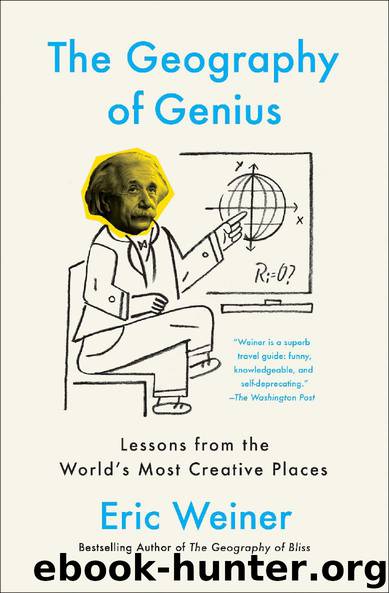The Geography of Genius by Eric Weiner

Author:Eric Weiner
Language: eng
Format: epub
Publisher: Simon & Schuster
Published: 2016-01-05T00:00:00+00:00
* * *
I’m walking along the Royal Mile one day, feeling pleased with my progress, when I spot a church. Called St. Giles, it is impressive with its crown-shaped spire, elegant carvings, intricate stained glass windows, and ceilings that stretch heavenward. It is, though, a church, and in Europe churches are nearly as common as pubs, though if it’s elbow room you crave, the church, not the pub, is your best bet. These days, most Europeans have no use for religion.
Usually, neither would someone such as me, hot on the scent of creative genius. In the places I’ve visited so far, religion had little to do with the flowering of genius. If anything, the religious institutions tended to squelch innovation. This isn’t surprising. A basic tension existed. The Church (or mosque or synagogue) was the keeper of tradition; creativity, at least in the Western formulation, represents a break with tradition. It’s a recipe for conflict.
Sometimes, the most religion can do is get out of the way. That is what the Catholic Church did, at least partially, during the Renaissance. In Hangzhou, religion was a loose affair, flexible enough to allow for experimentation and “strange doctrines.” Before the advent of Islam, the Arab peoples constituted a cultural backwater. With the exception of poetry, they contributed virtually nothing to world civilization, unlike their neighbors—the Egyptians, the Sumerians, the Babylonians, the Persians. Islam changed all that. Shortly after its advent, the Arabs excelled in fields from astronomy to medicine to philosophy. The Muslim golden age stretched from Morocco to Persia and spanned many centuries.
Likewise, the Scottish Presbyterian Church, known as the Kirk, played a major, albeit unintentional role in the Enlightenment. To tell this tale, we need to take a giant step back, to the beginning.
In the beginning, there was the Word. The Word was good, but hardly anyone could read the Word, or any word. This was frustrating for all. Being illiterate in the eighteenth century was like having a dial-up connection in the twenty-first. You’re awash in a sea of information, but little reaches you, and what does takes a long time to download.
The Scottish Church knew it needed to do something so it launched a major literacy campaign. This succeeded beyond anyone’s wildest expectations. Within a century, nearly every parish had a school. Suddenly, Scotland, the poorest nation in Western Europe, boasted the highest literacy rate in the world. People could now read the Word. So far, so good.
What the Church didn’t count on, though, was that people could also read other words. This is how new technologies work. Once unleashed, they can’t be contained. The Church teaches people to read so they can access the Bible, and next thing you know everyone’s reading Milton and Dante. A group of nerdy scientists concoct a computer network so they can share technical data, and next thing you know you’re buying underwear online.
The Scots, like the Florentines, fell in love with books but with a significant difference. By now, Gutenberg’s printing press was in widespread use.
Download
This site does not store any files on its server. We only index and link to content provided by other sites. Please contact the content providers to delete copyright contents if any and email us, we'll remove relevant links or contents immediately.
Rewire Your Anxious Brain by Catherine M. Pittman(17585)
Talking to Strangers by Malcolm Gladwell(11875)
The Art of Thinking Clearly by Rolf Dobelli(8841)
Mindhunter: Inside the FBI's Elite Serial Crime Unit by John E. Douglas & Mark Olshaker(7833)
Becoming Supernatural by Dr. Joe Dispenza(7103)
Change Your Questions, Change Your Life by Marilee Adams(6639)
Nudge - Improving Decisions about Health, Wealth, and Happiness by Thaler Sunstein(6633)
The Road Less Traveled by M. Scott Peck(6633)
The Lost Art of Listening by Michael P. Nichols(6469)
Enlightenment Now: The Case for Reason, Science, Humanism, and Progress by Steven Pinker(6405)
Win Bigly by Scott Adams(6310)
Mastermind: How to Think Like Sherlock Holmes by Maria Konnikova(6234)
The Way of Zen by Alan W. Watts(5798)
Daring Greatly by Brene Brown(5639)
Grit by Angela Duckworth(4735)
Big Magic: Creative Living Beyond Fear by Elizabeth Gilbert(4723)
Men In Love by Nancy Friday(4319)
Flow by Mihaly Csikszentmihalyi(4051)
The Four Tendencies by Gretchen Rubin(4024)
